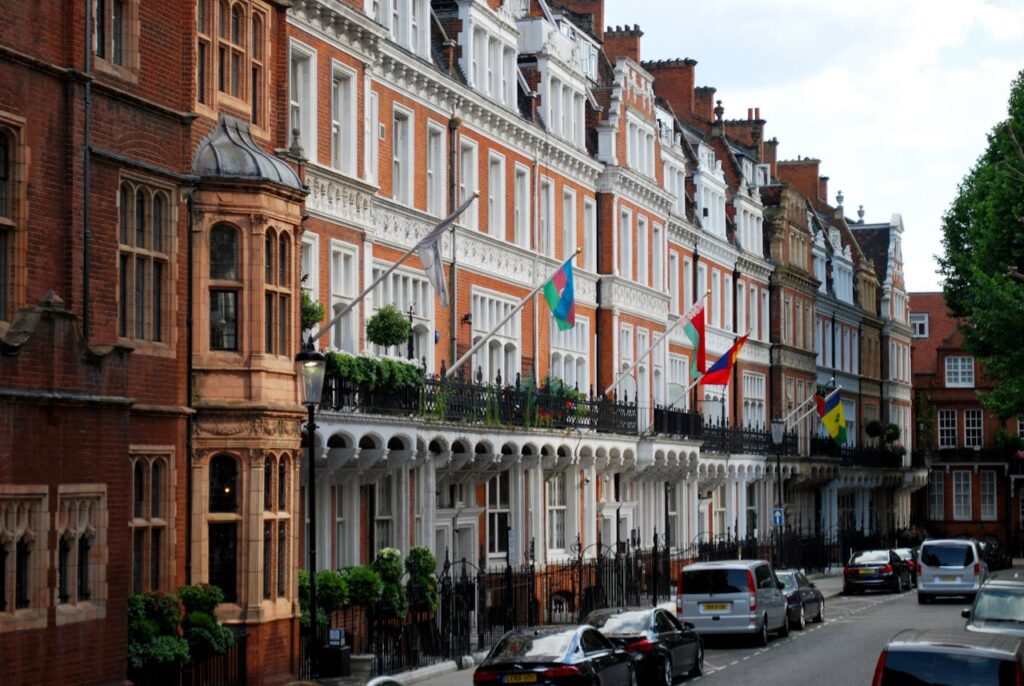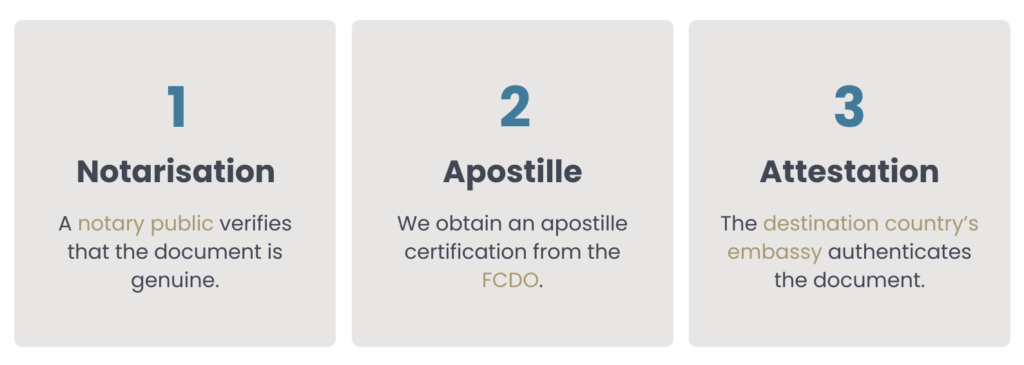
Attestation is the process of authenticating a document at the Embassy or High Commission of the country where you intend to use it. This is often called consular legalisation. You typically need an attestation for your document if the recipient country is not a member of the Hague Apostille Convention.
In this article, we’ll define attestation, explain when you need it and go through the process for consular legalisation.
What is Attestation?
Attestation, also known as consular legalisation or authentication, is when a country’s Embassy verifies your document’s authenticity so you can use it in their country.
This is often necessary when using legal or official documents in a foreign country.
These documents might include:
- Birth certificates
- Marriage certificates
- Educational diplomas
- Business documents
Attestation is the third and final step of verification for your document. First, you require notarisation and an apostille. Luckily, a notary public like Notary.co.uk can manage the entire process for you.

When Do You Need Attestation?
You need attestation when you have to use an official document in certain foreign countries and it requires verification.
If the country is a member of the Hague Apostille Convention, you just need notarisation and an apostille. If it is not, you need to have the document verified at the country’s Embassy nearest to where you live.
Countries that often require attestation include:
- Afghanistan
- Bangladesh
- Egypt
- Jordan
- Qatar
- Thailand
- UAE
- Vietnam
Attestation vs. Apostille: Explaining the Difference
An apostille is a standardised form of document legalisation accepted by member countries of the Hague Apostille Convention.
What is an attestation? This is a process of document authentication carried out by the consular section of the recipient country’s Embassy or High Commission.
The confusing part: if you need attestation, you need an apostille first. Even if the recipient country is not a member of the Hague Apostille Convention, they consider the apostille a prerequisite for consular legalisation.

How Embassies and Consulates Attest Documents
If your document will be used in Vietnam, it needs to be attested by the Vietnamese Embassy in the country where it was issued.
How does a Vietnamese diplomatic service officer know that a British document is genuine?
They don’t. That’s why you need to have your document verified by the British government’s Foreign, Commonwealth & Development Office (FCDO) beforehand. The FCDO will apply an apostille certificate, and usually this is all the Embassy needs to attest the document.
Unfortunately, no Embassies and Consulates currently accept e-apostilled documents.
If your business document will be used in Iraq, we will need to have it stamped at the Arab-British Chamber of Commerce before proceeding to attestation.
When is Translation Needed?
Some High Commissions require a translated copy of your document. Currently, you need translations for attestation by Angola, Cuba and Libya.
We can provide a certified translation and keep the process running as smoothly as possible.
How to Get Your Document Attested
You can submit your document(s) for attestation via a registered notary public. They will first verify the authenticity of the document and apply a notarial certificate, then obtain an apostille, and finally submit the document to the consular section of the recipient country’s Embassy.
Check the requirements of the party requesting your documents and reach out to receive a quote.
The Process for Consular Legalisation
- Reach Out to Us: Contact our team via phone or online form to discuss your requirements. We will provide a quote – including the fees charged by the specific Embassy/High Commission and the FCDO – and explain the next steps.
- Instruct us: Complete our Client Registration Form and share two forms of ID. If you have an educational document, wee may also ask you to complete a consent form to allow us to verify your document with the issuing institution.
- Send us the document: We usually require the original document, but in some instances a scan or PDF copy will be sufficient. If you are signing a document, you will most likely need to attend an appointment at our office.
- Notarisation: Our team will certify your document as required and issue a notarial certificate.
- Apostille: We will obtain an apostille via the FCDO in Milton Keynes. We offer a premium or standard service.
- Attestation: We will arrange consular legalisation at the Embassy or High Commission of the country where you will be using the document. Then, we will return the legalised document in the agreed timeframe.
Arrange Your Attestation
Getting your document attested can seem complicated, but we handle the whole process. All you have to do is supply your document!
Get your document legalised now with our fast and professional service. Call 020 7630 1777, email info@notary.co.uk or scroll down to fill in our contact form.

